经典英语语法100句
高中英语2024届高考语法名句(共100个)
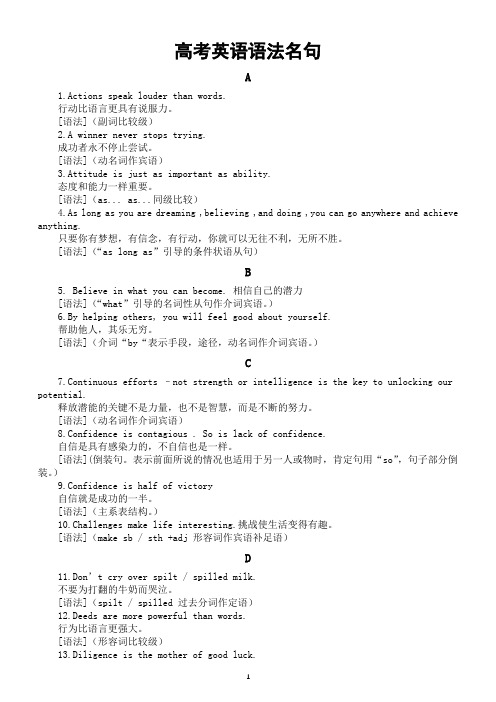
高考英语语法名句A1.Actions speak louder than words.行动比语言更具有说服力。
[语法](副词比较级)2.A winner never stops trying.成功者永不停止尝试。
[语法](动名词作宾语)3.Attitude is just as important as ability.态度和能力一样重要。
[语法](as... as...同级比较)4.As long as you are dreaming ,believing ,and doing ,you can go anywhere and achieve anything.只要你有梦想,有信念,有行动,你就可以无往不利,无所不胜。
[语法](“as long as”引导的条件状语从句)B5. Believe in what you can become. 相信自己的潜力[语法](“what”引导的名词性从句作介词宾语。
)6.By helping others, you will feel good about yourself.帮助他人,其乐无穷。
[语法](介词“by“表示手段,途径,动名词作介词宾语。
)C7.Continuous efforts –not strength or intelligence is the key to unlocking our potential.释放潜能的关键不是力量,也不是智慧,而是不断的努力。
[语法](动名词作介词宾语)8.Confidence is contagious . So is lack of confidence.自信是具有感染力的,不自信也是一样。
[语法](倒装句。
表示前面所说的情况也适用于另一人或物时,肯定句用“so”,句子部分倒装。
)9.Confidence is half of victory自信就是成功的一半。
[语法](主系表结构。
)10.Challenges make life interesting.挑战使生活变得有趣。
100个句子搞定英语语法
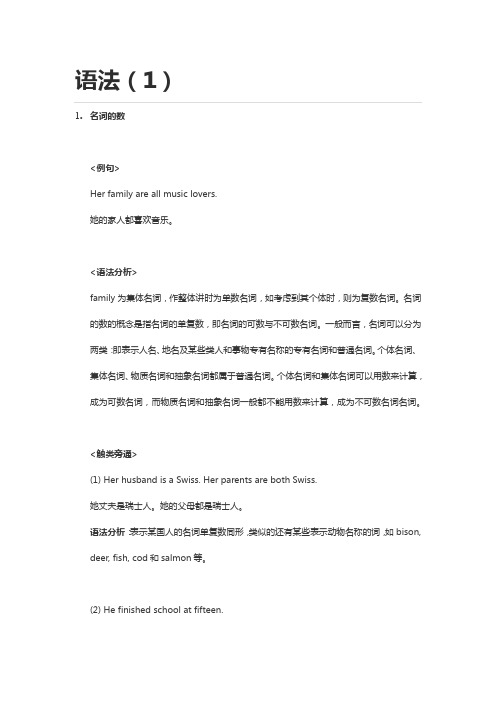
语法(1)1.名词的数<例句>Her family are all music lovers.她的家人都喜欢音乐。
<语法分析>family为集体名词,作整体讲时为单数名词,如考虑到其个体时,则为复数名词。
名词的数的概念是指名词的单复数,即名词的可数与不可数名词。
一般而言,名词可以分为两类:即表示人名、地名及某些类人和事物专有名称的专有名词和普通名词。
个体名词、集体名词、物质名词和抽象名词都属于普通名词。
个体名词和集体名词可以用数来计算,成为可数名词,而物质名词和抽象名词一般都不能用数来计算,成为不可数名词名词。
<触类旁通>(1) Her husband is a Swiss. Her parents are both Swiss.她丈夫是瑞士人。
她的父母都是瑞士人。
语法分析:表示某国人的名词单复数同形,类似的还有某些表示动物名称的词,如bison, deer, fish, cod和salmon等。
(2) He finished school at fifteen.他十五岁中学毕业。
语法分析:有些个体名词用作抽象名词,在意义上是不可数名词的。
(3) How much machinery has been installed?装了多少机器?语法分析:有不少名词在汉语中是可数的,而在英语中确是不可数的。
(4) There is a beauty in simplicity.朴实之中有一种美。
语法分析:在多数情况下抽象名词用于单数形式,某些时候,也可以在其前面加定冠词或不定冠词。
(5) Two beers, please.请来两杯啤酒。
语法分析:一般说来,物质名词是不可数的,因而没有复数形式,但有些物质名词用作可数名词可用来表示“一份”、“一杯”或“一种”等意义。
(6) He came up to shake hands with me.他走过来和我握手。
语法分析:有些名词在某些习惯性的用法中,要用复数,成为相互复数。
名言警句英语语法

名言警句英语语法1. "Practice makes perfect." ——熟能生巧。
2. "Actions speak louder than words." ——行动胜于言辞。
3. "A stitch in time saves nine." ——及时行动,事半功倍。
4. "The early bird catches the worm." ——早起的鸟儿有虫吃。
5. "You can't judge a book by its cover." ——不能以貌取人。
6. "Rome wasn't built in a day." ——罗马不是一天建成的。
7. "When the going gets tough, the tough get going." ——艰难时刻,强者自强。
8. "A rolling stone gathers no moss." ——滚石不生苔。
9. "The pen is mightier than the sword." ——文笔胜于武力。
10. "The grass is always greener on the other side." ——这山望着那山高。
11. "A journey of a thousand miles begins with a single step." ——千里之行,始于足下。
12. "You miss 100% of the shots you don't take." ——不尝试就永远没有机会。
13. "The best time to plant a tree was 20 years ago. The second best time is now." ——种树的最佳时间是20年前,其次是现在。
100句经典句型攻克英语语法03
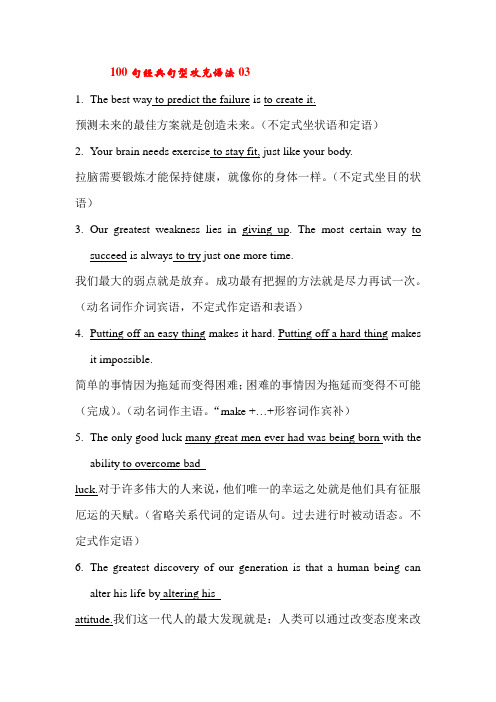
100句经典句型攻克语法031.The best way to predict the failure is to create it.预测未来的最佳方案就是创造未来。
(不定式坐状语和定语)2.Your brain needs exercise to stay fit, just like your body.拉脑需要锻炼才能保持健康,就像你的身体一样。
(不定式坐目的状语)3.Our greatest weakness lies in giving up. The most certain way tosucceed is always to try just one more time.我们最大的弱点就是放弃。
成功最有把握的方法就是尽力再试一次。
(动名词作介词宾语,不定式作定语和表语)4.Putting off an easy thing makes it hard. Putting off a hard thing makesit impossible.简单的事情因为拖延而变得困难;困难的事情因为拖延而变得不可能(完成)。
(动名词作主语。
“make +…+形容词作宾补)5.The only good luck many great men ever had was being born with theability to overcome badluck.对于许多伟大的人来说,他们唯一的幸运之处就是他们具有征服厄运的天赋。
(省略关系代词的定语从句。
过去进行时被动语态。
不定式作定语)6.The greatest discovery of our generation is that a human being canalter his life by altering hisattitude.我们这一代人的最大发现就是:人类可以通过改变态度来改变自己的生活。
(表语从句。
动名词作介词宾语)7.It is not what happens to you; it is what you do with what happens toyou.重要的不是在你身上发现了什么,而是应变时你所做的事情。
初中最重要的100个英语句型,没理由不掌握!

【导语】学习英语贵在坚持,找到适合⾃⼰的⽅法,多运⽤多温故。
欢迎阅读为⼤家精⼼整理的初中最重要的100个英语句型!欢迎阅读学习!更多相关讯息请关注!1. welcome to sp 欢迎到某地Eg. Welcome to China.2. What’s the matter with sb./ sth? 出什么⽑病了?Eg. What’s the matter with your watch?3. be different from 与......不同Eg. The weather in Beijing is different from that of Nanjing.4. be the same as 与……相同Eg. His trousers are the same as mine.5. be friendly to sb. 对某⼈友好Eg. Mr. Wang is very friendly to us.6. want to do sth. 想做某事Eg. I want to go to school.7. want sb. to do sth. 想让某⼈做某事Eg. I want my son to go to school.8. what to do 做什么Eg. We don’t know what to do next.9. let sb. do sth. 让某⼈做某事Eg. Let him enter the room.10. let sb. not do sth. 让某⼈不做某⼈Eg. Let him not stand in the rain.11. why don’t you do sth?怎么不做某事呢?Eg. Why don’t you play football with us?12. why not do sth.? 怎么不做某事呢?Eg. Why not play football with us?13. make sb. sth. 为某⼈制造某物Eg. My father made me a kite.14. make sth for sb. 为某⼈制造某物Eg. My father made a kite for me.15. What …mean by …? 做……是什么意思?Eg. What do you mean by doing that?16. like doing sth. 喜欢做某事Eg. Jim likes swimming.17. like to do sth. 喜欢做某事Eg. He doesn’t like to swim now.18. feel like doing sth. 想做某事Eg. I feel like eating bananas.19. would like to do sth. 愿意做某事Eg. Would you like to go rowing with me?20. would like sb. to do sth. 愿意某⼈做某事Eg. I’d like you to stay with me tonight.21. make sb. do sth. 使某⼈做某事Eg. His brother often makes him stay in the sun.22. let sb. do sth. 让某⼈做某事Eg. Let me sing a song for you.23. have sb. do sth. 使某⼈做某事Eg. You shouldn’t have the students work so hard.24. be far from sp 离某地远Eg. His school is far from his home.25. be near to sp 离某地近Eg. The hospital is near to the post office.26. be good at sth./doing sth. 擅长某事/做某事Eg. We are good at English.They are good at boating.27. It takes sb. some time to do sth. 某⼈花多少时间做某事Eg. It took me more than a year to learn to draw a beautiful horse in five minutes.28. sb. spends some time/money (in )doing sth. 某⼈花多少时间做某事Eg. I spent twenty years in writing the novel.29. sb. spends some time/money on sth. 某事花了某⼈多少时间/⾦钱Eg. Jim spent 1000 yuan on the bike.30. sth. costs sb. some money. 某物花了某⼈多少钱Eg. The bike cost Jim 1000 yuan.31. sb. pays some money for sth. 某⼈为某物付了多少钱Eg. Jim paid 1000 yuan for the bike.32. begin/start with sth. 开始做某事Eg. The started the meeting with a song.33. be going to do sth. 打算做某事Eg. We are going to study in Japan.34. call A B 叫A BEg. They called the village Gumtree.35. thank sb. for sth./doing sth. 感谢某⼈做某事Eg. Thank you for your help.Thank you for helping me.36. What ……for? 为什么Eg. What do you learn English for?37. How/ what about doing sth.?做某事怎么样?Eg. How about going fishing?38. S +be+ the+级+of/in短语Eg. Lucy is the tallest in her class.39. S + be +⽐较级+than any other + n.Eg. Lucy is taller than any other student in her class.40. have to do sth. 不得不做某事Eg. I have to go home now.41. had better do sth. 做某事Eg. You’d better study hard at English.42. had better not do sth. 别做某事Eg. You’d better not stay up.43. help sb. to do sth. 帮助某⼈做某事Eg. Lucy often helps Lily to wash her clothes.44. help sb. do sth. 帮助某⼈做某事Eg. He usually helps me learn English.45. help sb. with sth. 帮助某⼈做某事Eg. I sometimes help my mother with the housework.46. make it +时间把时间定在⼏点Eg. Let’s make it 8:30.47. take sb. to sp 带某⼈到某地Eg. Mr. Wang will take us to the Summer Palace next Sunday.49. have nothing to do (with sb) 与某⼈没有关系Eg. That has nothing to do with me.50. 主语+ don’t think + 从句认为……不……Eg. I don’t think it will rain tomorrow.51. It’s + adj.+ for sb. to do sth. 做某事对某⼈来说怎么样Eg. It is lucky for you to go to London.52. How + adj/ adv + 主+ 谓!多么……啊!Eg. How beautiful the flower is!53. what + a/an + adj + n + 主+ 谓!Eg. What an beautiful flower it is!54. What + adj+ pl./[u] +主+ 谓!Eg. What bad weather it is today!55. find it + adj+ to do sth. 发现做某事如何Eg. I find it hard to speak English well!56. ask sb. for sth. 向某⼈要某物Eg. They often ask me for money.57. need to do sth. 需要做某事Eg. You need to study hard.58. need sth 需要某物Eg. I don’t need your money.59. use A to do B ⽤A来做BEg. We use pens to write.60. show sb. sth 给某⼈看某物Eg. Please show me the map.61. show sth. to sb. 把某物给某⼈看Eg. Please show the map to me.62. pass sb. sth. 把某物递给某⼈Eg. Pass me the cup of tea.63. pass sth. to sb. 把某物递给某⼈Eg. Pass the cup of tea to me.64. buy sb. sth. 为某⼈买某物Eg. Mother bought me a bike.65. buy sth. for sb. 为某⼈买某物Eg. Mother bought a bike for me.66. give sb. sth 把某物给某⼈Eg. Jim gave me an English dictionary.67. give sth. to sb. 把某物给某⼈Eg. Jim gave an English dictionary to me.68. get to sp 达到某地Eg. I got to Beijing on the morning of May 1st.69. arrive at /in sp 达到某地Eg. I arrived in Beijing on the morning of May 1st.70. reach sp 到达某地Eg. I reached Beijing on the morning of May 1st.71. hope to do sth. 希望某⼈做某事Eg. I hope to see you soon.72. there is sth. wrong with sth./sb. 某物/某⼈出什么状况了Eg. There is something wrong my car.73. sth. is wrong with … 某物出什么⽑病了Eg. Something is wrong with my car.74. How do you like sth? 你认为……怎么样?Eg. How do you like Beijing?75.What do you think of sth.? 你认为……怎么样?Eg. What do you think of Beijing?76. start doing sth. 开始做某事Eg. I started learning English in 1983.77. start to do sth. 开始做某事Eg. I started to watch TV after finishing my homework.78.finish doing sth. 完成作某事Eg. I finished cleaning my car just now.79. enjoy doing sth. 喜欢做某事Eg. They all enjoy living and working in China.80.What / when / where / who / something / anything / nothing else …… 别的什么/何时/何地/谁……Eg. What else do you want to buy?Where else have you gone?Who else have you played with?I have nothing else to tell you.Would you like something else?81. forget doing sth. 忘记做过某事了(已做)Eg. I forgot turning off the lights. Look, it is dark in the room.82. forget to do sth. 忘了做某事了(未做)Eg. I forgot to turn off the lights. Could you go back and shut the off?83. remember doing sth. 记得做过某事了(已做)Eg. I remembered returning your money. You are so forgetful.84. remember to do sth. 记住去做某事(未做)Eg. Remember to bring me some money. I’ve run out of it.85.stop to do sth. 停下来去做某事Eg. He stopped to talk with Mary when she enter the office.86. stop doing sth. 停⽌做某事Eg. The students stopped talking when the teachet came in.87. watch/see/hear sb. do sth. 观看/看见/听见某⼈做了某事(全过程)Eg. I saw you pick an apple just now.88. watch/see/hear sb. doing sth. 观看/看见/听见某⼈正在做某事(点动作)Eg. I saw you playing basketball with your classmates on the playground last Sunday.89. go on doing sth. 继续作某事Eg. He went on reading after a short rest.90. go on to do sth. 继续作某事Eg. He went on to read after finishing wash the dishes.91. go on with sth. 继续某事Eg. He went on with his work after a short rest.92. say hello/goodbye to sb. 向某⼈告别Eg.I came to say good-bye to you.93. be busy doing sth. 忙于做某事Eg. They are busy planting trees on the hill.94. be interested in sth. 对某事感兴趣Eg. English is very interesting. We are all interested in it.95. tell sb. to do sth. 告诉某⼈做某事Eg. Mother told me to go shopping with her.96. ask sb. to do sth. 让某⼈做某事Eg. Jim ask me to go rowing with him.97. call/ring sb. up 给某⼈打电话Eg. I will call you up tommow.98. be ready to do sth. 准备做某事Eg. We are ready to have lunch.99. go doing sth. 去做某事Eg. Let’s go fishing.100. prefer A/doing A to B/doing B ⽐起A/做A,更喜欢B/做B Eg. Lucy prefers English to French.I prefer staying at home to going to the cinema.。
英语常见句型100例
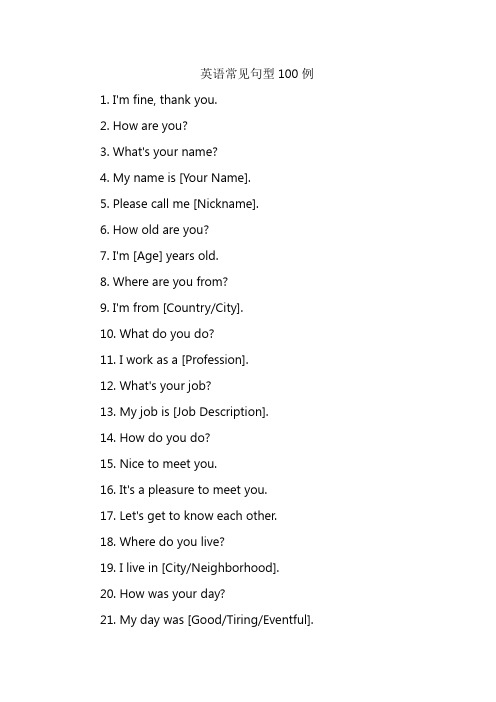
英语常见句型100例1. I'm fine, thank you.2. How are you?3. What's your name?4. My name is [Your Name].5. Please call me [Nickname].6. How old are you?7. I'm [Age] years old.8. Where are you from?9. I'm from [Country/City].10. What do you do?11. I work as a [Profession].12. What's your job?13. My job is [Job Description].14. How do you do?15. Nice to meet you.16. It's a pleasure to meet you.17. Let's get to know each other.18. Where do you live?19. I live in [City/Neighborhood].20. How was your day?21. My day was [Good/Tiring/Eventful].22. What did you do today?23. I went to [Place/Event].24. What are you doing?25. I'm [Activity].26. What are your plans for the weekend?27. My plans are to [Activity/Plan].28. Would you like to come over?29. I'd love to.30. Can I help you with anything?31. Yes, I could use some help with [Task].32. Excuse me, where is the [Place]?33. It's over there, to the left.34. I'm sorry for [Mistake/Incident].35. That's okay, don't worry about it.36. Thank you for your help.37. You're welcome.38. I appreciate it.39. No problem.40. Can I borrow [Item]?41. Sure, here you go.42. I'll be right back.43. I'll see you later.44. Take care.45. Good luck!46. Congratulations!47. I'm sorry to hear that.48. What's the matter?49. I'm feeling [Sad/Tired/Sick].50. Do you need a doctor?51. I think I'll be alright.52. What's your favorite [Food/Color/Book]?53. My favorite is [Preference].54. I like [Activity/Thing].55. I don't like [Activity/Thing].56. Do you speak [Language]?57. Yes, I speak [Language] fluently.58. I can speak a little [Language].59. Could you repeat that, please?60. Of course, [Statement] again.61. I didn't catch that.62. Could you speak slower, please?63. I'm trying to learn English.64. Would you like to practice with me?65. I'm hungry/thirsty.66. Let's go get something to eat/drink.67. What do you recommend?68. The [Dish/Drink] here is great.69. Can I get the bill, please?70. Let's go to the [Place].71. I'll meet you there.72. What time is it?73. It's [Time].74. I'm late.75. I'm on time.76. I'll be late.77. I apologize for being late.78. It was my fault.79. That was my mistake.80. I'll fix it.81. I don't understand.82. Can you explain it to me?83. It's not what I expected.84. I'm looking forward to [Event].85. I'm excited about [Plan].86. I'm worried about [Issue].87. I'm confident that [Outcome].88. I agree with you.89. I disagree.90. Let's compromise.91. I think we should [Suggestion].92. What do you think about [Topic]?93. In my opinion, [Your Opinion].94. I believe that [Belief].95. I have a dream of [Dream].96. My goal is to [Goal].97. I'm proud of you.98. I admire your [Quality/Skill].99. I miss you.100. I love you.。
英语语法大招100条
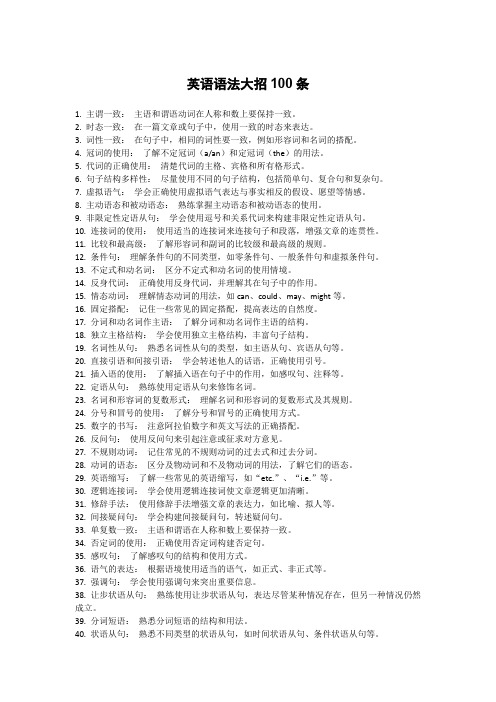
英语语法大招100条1. 主谓一致:主语和谓语动词在人称和数上要保持一致。
2. 时态一致:在一篇文章或句子中,使用一致的时态来表达。
3. 词性一致:在句子中,相同的词性要一致,例如形容词和名词的搭配。
4. 冠词的使用:了解不定冠词(a/an)和定冠词(the)的用法。
5. 代词的正确使用:清楚代词的主格、宾格和所有格形式。
6. 句子结构多样性:尽量使用不同的句子结构,包括简单句、复合句和复杂句。
7. 虚拟语气:学会正确使用虚拟语气表达与事实相反的假设、愿望等情感。
8. 主动语态和被动语态:熟练掌握主动语态和被动语态的使用。
9. 非限定性定语从句:学会使用逗号和关系代词来构建非限定性定语从句。
10. 连接词的使用:使用适当的连接词来连接句子和段落,增强文章的连贯性。
11. 比较和最高级:了解形容词和副词的比较级和最高级的规则。
12. 条件句:理解条件句的不同类型,如零条件句、一般条件句和虚拟条件句。
13. 不定式和动名词:区分不定式和动名词的使用情境。
14. 反身代词:正确使用反身代词,并理解其在句子中的作用。
15. 情态动词:理解情态动词的用法,如can、could、may、might等。
16. 固定搭配:记住一些常见的固定搭配,提高表达的自然度。
17. 分词和动名词作主语:了解分词和动名词作主语的结构。
18. 独立主格结构:学会使用独立主格结构,丰富句子结构。
19. 名词性从句:熟悉名词性从句的类型,如主语从句、宾语从句等。
20. 直接引语和间接引语:学会转述他人的话语,正确使用引号。
21. 插入语的使用:了解插入语在句子中的作用,如感叹句、注释等。
22. 定语从句:熟练使用定语从句来修饰名词。
23. 名词和形容词的复数形式:理解名词和形容词的复数形式及其规则。
24. 分号和冒号的使用:了解分号和冒号的正确使用方式。
25. 数字的书写:注意阿拉伯数字和英文写法的正确搭配。
26. 反问句:使用反问句来引起注意或征求对方意见。
100句英语常用句型

100句英语常用句型一、表达观点1.In my opinion,...(在我看来……)2.I think...(我认为……)3.As far as I'm concerned,...(就我而言……)4.It seems to me that...(在我看来……)5.I believe...(我相信……)6.From my perspective,...(从我的角度来看……)7.Personally, I feel that...(就个人而言,我觉得……)二、询问意见8.What's your opinion?(你有什么看法?)9.How do you think about it?(你觉得怎么样?)10.What's your view on this matter?(你对这件事有什么看法?)11.Do you have any thoughts on...?(你对……有什么想法吗?)12.Could you give me your opinion on...?(你能给我你对……的意见吗?)三、同意与不同意13.I agree with you.(我同意你的观点。
)14.I couldn't agree more.(我完全同意。
)15.That's exactly what I think.(那正是我所想的。
)16.I'm of the same opinion.(我有同样的看法。
)17.On the contrary, I don't think so.(相反,我不这么认为。
)18.I disagree with you.(我不同意你的观点。
)19.I'm afraid I can't agree.(恐怕我不能同意。
)20.That's not how I see it.(我不是这么看的。
)四、请求帮助21.Could you help me?(你能帮我吗?)22.Would you please do me a favor?(你能帮我个忙吗?)23.Can you give me a hand?(你能帮我一下吗?)24.I need your help.(我需要你的帮助。
- 1、下载文档前请自行甄别文档内容的完整性,平台不提供额外的编辑、内容补充、找答案等附加服务。
- 2、"仅部分预览"的文档,不可在线预览部分如存在完整性等问题,可反馈申请退款(可完整预览的文档不适用该条件!)。
- 3、如文档侵犯您的权益,请联系客服反馈,我们会尽快为您处理(人工客服工作时间:9:00-18:30)。
1. Education is the door to freedom. 教育是通向自由之门。
[一个简单的主系结构]2. Challenges make life interesting.挑战使生活变得有趣。
[make+…+:形容词作宾语补足语。
]3. Difficulties make life worth living.困难让生活有价值。
[make+…+介词短语:介词短语作宾语补足语。
]4. Nothing in the world can take the place of persistence.世界上没有什么可以取代坚持。
[否定词作主语。
Take the place of:代替。
]5. It’s impossible to defeat a person who never gives up!打败一个永不放弃的人是不可能的。
[动词不定式作主语,“it”为形式主语。
“who”引导的定语从句修饰先行词”a person”。
]6. The most important thing in life is to have a great aim and the determination to attain it.生活中最重要的事情就是有一个远大的目标,并有决心实现它。
[动词不定式作表语和定语。
]7. If you can dream it, you can do it.只要你想得到,人就做得到。
[“if”引导的条件状语从句。
]8. Actions speak louder than words.行动比语言更加强大。
[副词比较级]9. Deeds are more powerful than words.行为比言语更加强大。
[形容语比较级]10. Mistakes show us what we still need to learn.从错误中我们知道该学什么。
[“what”引导的宾语从句作直接宾语。
从句中动词不定式作宾语。
]11. Difficult times show us who our true friends are.艰难岁月让我们知道谁是真正的朋友。
/患难见真情。
[“who”引导的宾语从句作宾语。
]12. It doesn’t cost anything to be nice.做好人是不费吹灰之力的。
[动词不定式作主语,“it”作形式主语。
]13. Believe in what you can become.相信自己的潜力。
[“what”引导的名词性从句作介词宾语。
]14. Think and your mind will stay fresh.思考能使大脑保持清醒。
[“祈使句+and+主句”结构,其中祈使句具有条件句的含义,意为:(只要)……使……。
]15. You win because you think you can.你成功是因为你认为你能成功。
[“because”引导的原因状语从句。
]16. By helping others, you will feel good about yourself.帮助他人,其乐无穷。
[介词“by”表示手段、途径,动名词作介词宾语。
]17. Lost time is never found again.时间一去不复返。
[过去分词作定语。
一般现在时被动语态。
]18. Rome wasn’t built in a day.罗马不是一天建成的。
[一般过去时被动语态。
]19. Never put off until tomorrow what you can do today.永远不要把今天能做的事拖延到明天。
[否定形式祈使句。
“what”引导的宾语从句作短语动词“put off”的宾语。
]20. Remember to smile when you wake up.记得在醒来的时候微笑。
[动词不定式作宾语。
“when”引导时间状语从句。
]21. Oversleeping will never make your dreams come true.睡觉永远不能让你梦想成真。
[动名词作主语。
不带“to”的动词不定式作宾补。
]22. Praise twice as much as you criticize.多表扬,少批评。
[比较级:倍数表示法。
]23. The way to be happy is to make others happy.快乐的方式就是先让别人快乐。
[动词不定式作定语和表语。
形容词作“make”的宾补。
]24. Life is too short to spend time worrying.生命太短暂了,不要花在焦虑上。
[动词不定式否定结构:“too…to…”表示“太……以至于不能……”,其中动词不定式作结果状语,现在分词固定结构:spend time doing…]25. What pains us trains us.使我们痛苦的东西在真正锻造我们。
[“what”引导主语从句。
]26. What doesn’t kill us makes us stronger.没有要我们命的事情让我们更强大。
[“what”引导主语从句。
]27. What hurts us the most teaches us the best.伤害我们最深的对我们教育最深。
[“what”引导主语从句。
副词最高级的运用。
]28. The dictionary is the only place where success comes before work.只有在字典中,成功才会出现在工作之前。
[“where”引导的定语从句。
]29. To be a great leader, you must have great hopes!要想成为伟大的领导者,就必须有伟大的抱负。
[动词不定式作目的状语。
]30. He who is ashamed of asking is ashamed of learning.耻于问者耻于学。
[“who”引导的定语从句。
动名词作介词宾语。
]31. He who fails to plan, plans to fail.不计划的人是注定要失败的。
[“who”引导的定语从句修饰主语,动词不定式作动词宾语。
]32. He who makes no mistakes makes nothing.不犯错语的人将一事无成。
[“who”引导的定语从句修饰主语。
双重否定。
]33. Imagination is more important than knowledge.想像力比知识更重要。
[形容词比较级。
]34. The hotter the fire, the harder the steel.为烧得越旺,(锻造出来的)钢铁就越坚硬。
[形容词比较级结构:the+比较级,the+比较级(越……,就越……)]35. Do not let what you cannot do interfere with what you can do.决不要让你不能做的事妨碍到你能做的事。
[“what”引导的宾语从句作“动词宾语”和“介词宾语”,不带“to”的动词不定式作“let”的宾补。
]36. It’s how you deal with failure that determines how you achieve success.你对待失败的态度决定你如何取得成功。
[强调结构:强调“how”引导的主语。
后一个“how”引导宾语从句。
]37. Help others achieve their dreams and you will achieve yours.帮助他人实现他们的梦想,而你也将因此实现你自己的梦想。
[不带“to”的动词不定式作“help”的宾补。
“祈使句+and+主句”结构,祈使句带条件句的含义,意为:(只要)……就……。
]38. The achievement of your goal is assured the moment you commit yourself to it.一旦你全心投入,你目标的实现就得到了保证。
[一般现在时被动语态。
“the moment”引导时间状语从句,意思是“一……就……”。
]39. You become a winner the moment you believe you can win.在你相信自己能赢的时候,你就成为了胜利者。
[“the moment”引导时间状语从句,意思是“一……就……”。
状语从句中套宾语从句,作“believe”的宾语。
]40. Time and energy spent worrying are wasted.担扰烦恼,浪费时间,也是浪费精力。
[过去分词作定语。
一般现在时被动语态。
]41. The best way to predict the future is to create it.预测未来的最佳方案就是创造未来。
[动语不定式作定语和表语。
]42. Your brain needs exercise to stay fit, just like your body.大脑需要锻炼才能保持健康,就像你的身体一样。
[动语不定式作目的状语。
]43. Our greatest weakness lies in giving up. The most certain way to succeed is always to try just one more time.我们最大的弱点就在于放弃。
成功最有把握的方法就是尽力再试一次。
[动名语作介词宾语,动词不定式作定语和表语。
]44. Putting off an easy thing makes it hard. Putting off a hard thing makes it impossible.简单的事情因为拖延而变得困难;困难的事情因为拖延而变得不可能(完成)。
[动名词作主语。
“make+…+形容词(作补语)”结构。
]45. The only good luck many great men ever had was being born with the ability to overcome bad luck.对于许多伟大的人来说,他们唯一的幸运之处就是他们具有征服厄运的天赋。
[省略关系代词的定语从句。
过去进行时被动语态。
动词不定式作定语。
]46. The greatest discovery of our generation is that a human being can alter his life by altering his attitudes.我们这一代人的最大发现就是:人类可以通过改变态度来改变自己的生活。
